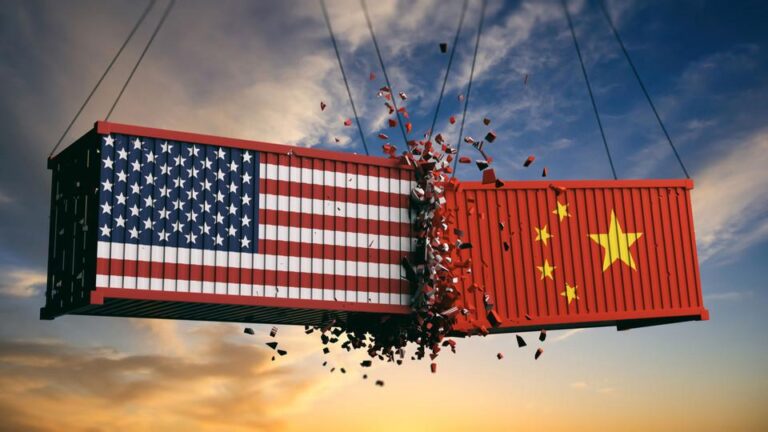Renewed Strains Ahead of US-China Trade Negotiations in London
As the forthcoming US-China trade discussions draw near, fresh disagreements have emerged, signaling persistent difficulties in the bilateral economic and geopolitical landscape. Both nations are grappling with intricate challenges that could influence global markets and future collaboration. Industry stakeholders and policymakers are vigilantly observing these developments, aware of the high stakes involved.
Heightened Disputes Over Technology Transfer and Intellectual Property Protection
With the London trade talks imminent, tensions are intensifying around the contentious issues of technology transfer and intellectual property rights (IPR). The United States has reiterated its concerns regarding alleged coercive technology transfer practices and insufficient enforcement of IPR laws. Meanwhile, China maintains that it has implemented substantial reforms and strengthened its legal systems to safeguard foreign intellectual property. This divergence in perspectives threatens to dominate the agenda and exacerbate an already fragile economic rapport.
Experts caution that unresolved conflicts in these domains could impede progress in critical industries such as advanced semiconductors, 5G networks, and artificial intelligence innovation. Key points of contention include:
- Compulsory transfer of proprietary technologies as a prerequisite for market entry
- Inconsistencies in patent and copyright enforcement mechanisms
- Concerns over data privacy and security linked to cross-border technology flows
The table below outlines the principal stances held by each country:
| Topic | US Perspective | China Perspective |
|---|---|---|
| Forced Technology Transfer | Calls for an immediate halt to coercive demands | Asserts that reforms have eradicated such practices |
| Intellectual Property Enforcement | Seeks stronger legal protections and harsher penalties | Points to improved domestic laws and judicial processes |
| Market Access | Advocates for reciprocal and open technology exchange | Emphasizes sovereign rights over technological development |
Conflicting Approaches to Tariffs and Trade Imbalances Impede Progress
Recent dialogues between US and Chinese officials have revealed deep-seated disagreements regarding tariff policies and the persistent trade imbalance. The US delegation insists on maintaining and rigorously enforcing tariffs to counteract what it views as unfair trade practices contributing to a significant trade deficit. Conversely, Chinese negotiators argue for the removal of tariffs, claiming they hinder economic growth and destabilize global markets. These opposing views present formidable barriers to achieving consensus.
Key issues fueling the stalemate include:
- Tariff Retaliations: The US prioritizes tariffs as protective measures for domestic industries.
- Trade Surplus Dynamics: China highlights its export-led growth model and calls for balanced discussions.
- Market Access Negotiations: Both sides debate the extent and timing of potential concessions.
The following table summarizes the main points of disagreement:
| Topic | US Stance | China Stance |
|---|---|---|
| Tariff Strategy | Preserve and enforce existing tariffs | Advocate for tariff elimination to boost trade |
| Trade Deficit | Address imbalance through tariff measures | Focus on expanding exports |
| Market Access | Demand stricter regulatory oversight | Seek relaxation of trade barriers |
Experts Stress the Importance of Transparent Regulatory Systems to Foster Confidence
In response to escalating tensions, economic analysts emphasize that establishing clear and transparent regulatory frameworks is essential for rebuilding trust between the US and China. Ambiguities in trade policies and inconsistent enforcement continue to spark disputes, undermining diplomatic progress. Clarifying compliance standards and dispute resolution mechanisms can create a more predictable environment for investors and multinational enterprises engaged in cross-border commerce.
Industry specialists recommend the following measures:
- Implementing uniform standards for tariffs and non-tariff barriers
- Strengthening collaboration on intellectual property safeguards
- Introducing expedited and impartial dispute adjudication
- Enhancing transparency in customs and trade regulations
- Establishing open forums for stakeholder dialogue and feedback
| Regulatory Area | Existing Challenge | Suggested Improvement |
|---|---|---|
| Tariff Implementation | Variable rates and exemptions causing confusion | Adopt standardized tariff schedules |
| IP Enforcement | Prolonged legal processes and weak protections | Introduce faster review and enforcement procedures |
| Customs Operations | Lack of transparency in documentation | Digitize and clarify customs protocols |
Strengthening Communication Channels to Avert Conflict Escalation
Given the resurgence of disputes ahead of the London trade talks, diplomats and experts underscore the urgent need to enhance communication frameworks. Current dialogue mechanisms are often criticized for being opaque and slow to respond, limiting their effectiveness in managing sensitive issues. Improved communication channels could serve as vital platforms to build mutual trust, minimize misunderstandings, and prevent escalation of conflicts.
Proposed enhancements include:
- Regular high-level dialogues: Establishing consistent meetings beyond formal negotiations to maintain ongoing engagement.
- Specialized crisis response teams: Dedicated units to promptly address emerging disputes before they intensify.
- Transparent compliance reporting: Public and periodic updates to ensure accountability and mutual awareness.
| Communication Method | Current State | Recommended Enhancement |
|---|---|---|
| Bilateral Negotiations | Irregular and reactive | Monthly scheduled meetings |
| Diplomatic Hotlines | Limited operational hours | 24/7 crisis management teams |
| Trade Compliance Transparency | Partial and inconsistent | Regular public disclosures |
Final Thoughts: Navigating a Complex Economic Partnership
As the US and China gear up for their next round of trade negotiations in London, the surfacing of new disputes highlights the enduring complexities of their economic relationship. The international community will be watching closely to see if negotiators can bridge these divides or if tensions will further complicate efforts to stabilize global trade. The results of these talks will not only influence bilateral commerce but also have significant repercussions for global economic diplomacy in the years ahead.




